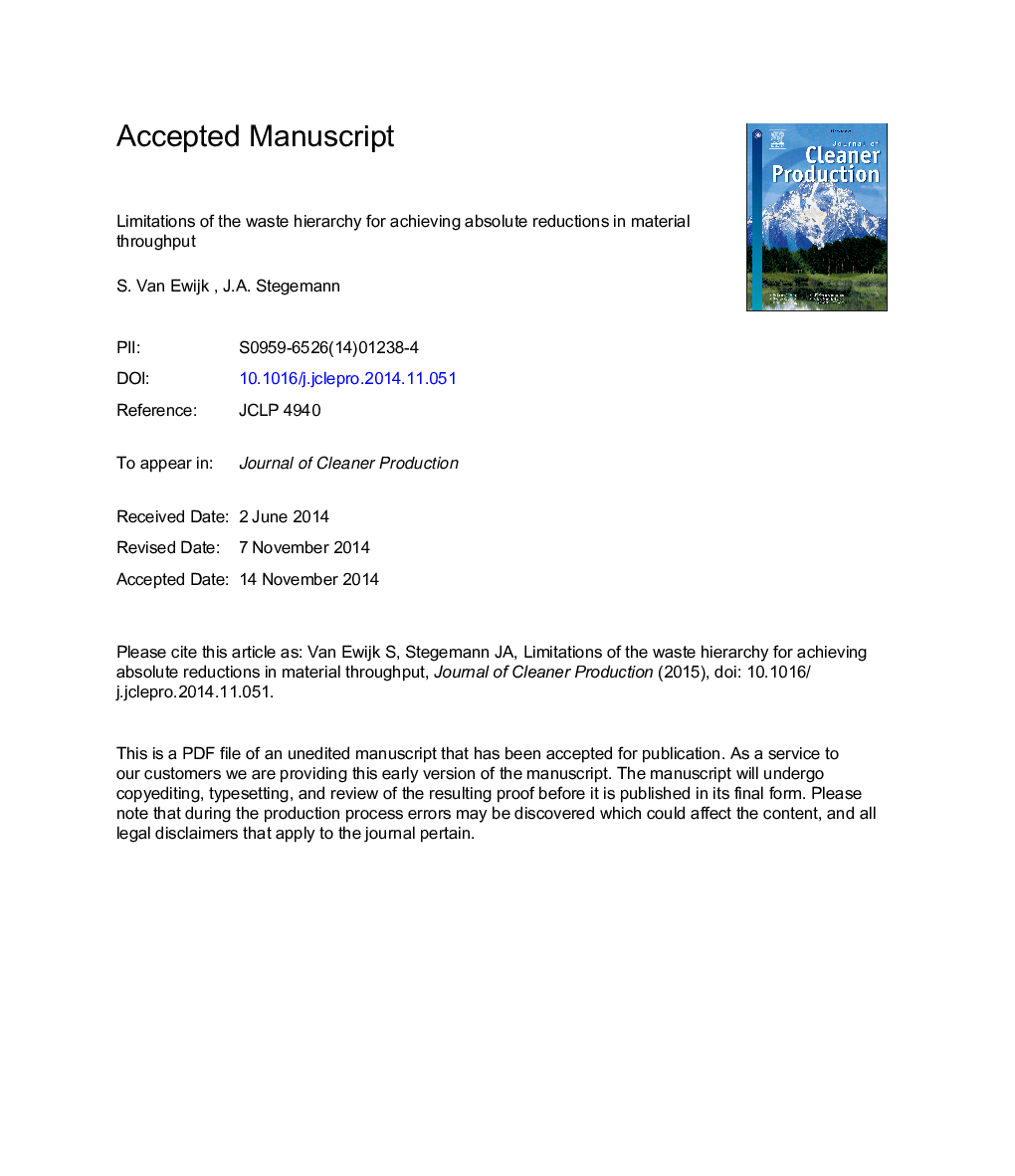| کد مقاله | کد نشریه | سال انتشار | مقاله انگلیسی | نسخه تمام متن |
|---|---|---|---|---|
| 8101485 | 1522117 | 2016 | 18 صفحه PDF | دانلود رایگان |
عنوان انگلیسی مقاله ISI
Limitations of the waste hierarchy for achieving absolute reductions in material throughput
ترجمه فارسی عنوان
محدودیت های سلسله مراتبی زباله برای دستیابی به کاهش مطلق در بازده مواد
دانلود مقاله + سفارش ترجمه
دانلود مقاله ISI انگلیسی
رایگان برای ایرانیان
کلمات کلیدی
سلسله مراتب زباله، مدیریت زباله، تامین مالی جلوگیری، کاهش مطلق،
ترجمه چکیده
تامین مواد خام می تواند به عنوان یک استراتژی قابل اندازه گیری و سریع برای تحقق پایداری باشد و نیازمند تغییر در مدیریت مواد ورودی و خروج های پسماند اقتصاد است. در حال حاضر، مدیریت زباله به شدت از سلسله مراتب زباله، یک فلسفه تاثیرگذار در مدیریت زباله و منابع است که اولویت بندی اعمال آن از پیشگیری از ضایعات به دفن زباله است. با وجود ورود و اولویت بندی پیشگیری در سلسله مراتب، نقش مثبت در استفاده از سلسله مراتب زباله در فرآوری مواد معدنی در اقتصاد، اجتناب ناپذیر است، و همچنین به طور قطعی مورد بررسی قرار نگرفته است. در این مقاله، سلسله مراتب زباله با مطالعه اهداف اصلی، پتانسیل آن برای دستیابی به اهداف و اجرای سیاست واقعی آن، بر اساس مفهومی تحلیل می شود. مسائل مربوط به سلسله مراتب شامل مشخصات محدود و اجرای پیشگیری، عدم راهنمایی برای انتخاب در میان سطوح سلسله مراتب و عدم تمایز بین حلقه باز و بازیافت حلقه بسته است. همچنین سلسله مراتب فقط اولویت های نسبی را تعریف می کند و از این رو تصمیماتی را که بر سایر بخش ها و نیز مدیریت پسماند تاثیر می گذارد، پشتیبانی نمی کند. این مقاله نتیجه می گیرد که سلسله مراتب زباله در شکل فعلی آن، پایه ای برای سیاست های زباله و منابع ناکافی برای دستیابی به مقادیر مطلوب تولید مواد است. پیشرفت های پیشنهادی عبارت است از تصویب یک مفهوم مبتنی بر ارزش زباله و اقدامات جمع آوری مرتبط، سیاست های دقیق تر و هدفمند در مورد گزینه های حداقل مطلوب مانند دفن زباله، تعیین اهداف مدیریت زباله بر اساس اهداف معیشت سازی و استفاده از سلسله مراتب زباله در یک چارچوب بهره وری منابع.
موضوعات مرتبط
مهندسی و علوم پایه
مهندسی انرژی
انرژی های تجدید پذیر، توسعه پایدار و محیط زیست
چکیده انگلیسی
Dematerialization can serve as a measurable and straightforward strategy for sustainability and requires changes in management of material inputs and waste outputs of the economy. Currently, waste management is strongly inspired by the waste hierarchy, an influential philosophy in waste and resource management that prioritizes practices ranging from waste prevention to landfill. Despite the inclusion and prioritization of prevention in the hierarchy, the positive contribution of the application of the waste hierarchy to dematerializing the economy is not inevitable, nor has it been conclusively studied. In this paper, the waste hierarchy is analyzed on a conceptual level by studying its original aims, its potential to fulfill those aims, and its actual policy implementation. Issues with the hierarchy include limited specification and implementation of prevention, a lack of guidance for choosing amongst the levels of the hierarchy and the absence of a distinction between open-loop and closed-loop recycling. Also, the hierarchy only communicates relative priorities and therefore does not support decisions that affect other sectors as well as waste management. The article concludes that the waste hierarchy in its current form is an insufficient foundation for waste and resource policy to achieve absolute reductions in material throughput. Suggested improvements are the adoption of a value-based conception of waste and related collection practices, more stringent and targeted policies on least desirable options like landfill, the specification of waste management targets based on dematerialization ambitions, and the use of the waste hierarchy within a resource productivity-oriented framework.
ناشر
Database: Elsevier - ScienceDirect (ساینس دایرکت)
Journal: Journal of Cleaner Production - Volume 132, 20 September 2016, Pages 122-128
Journal: Journal of Cleaner Production - Volume 132, 20 September 2016, Pages 122-128
نویسندگان
S. Van Ewijk, J.A. Stegemann,
